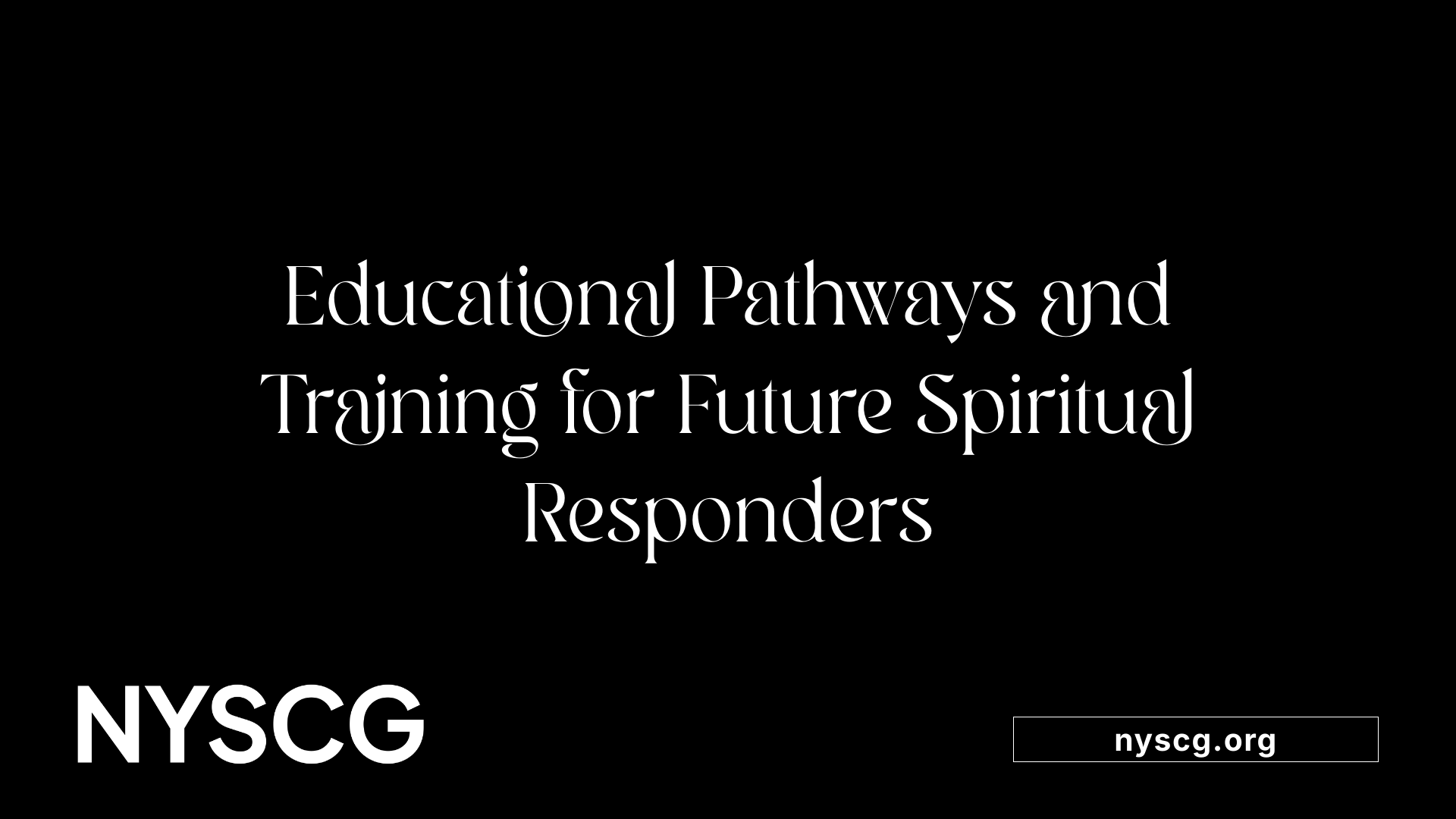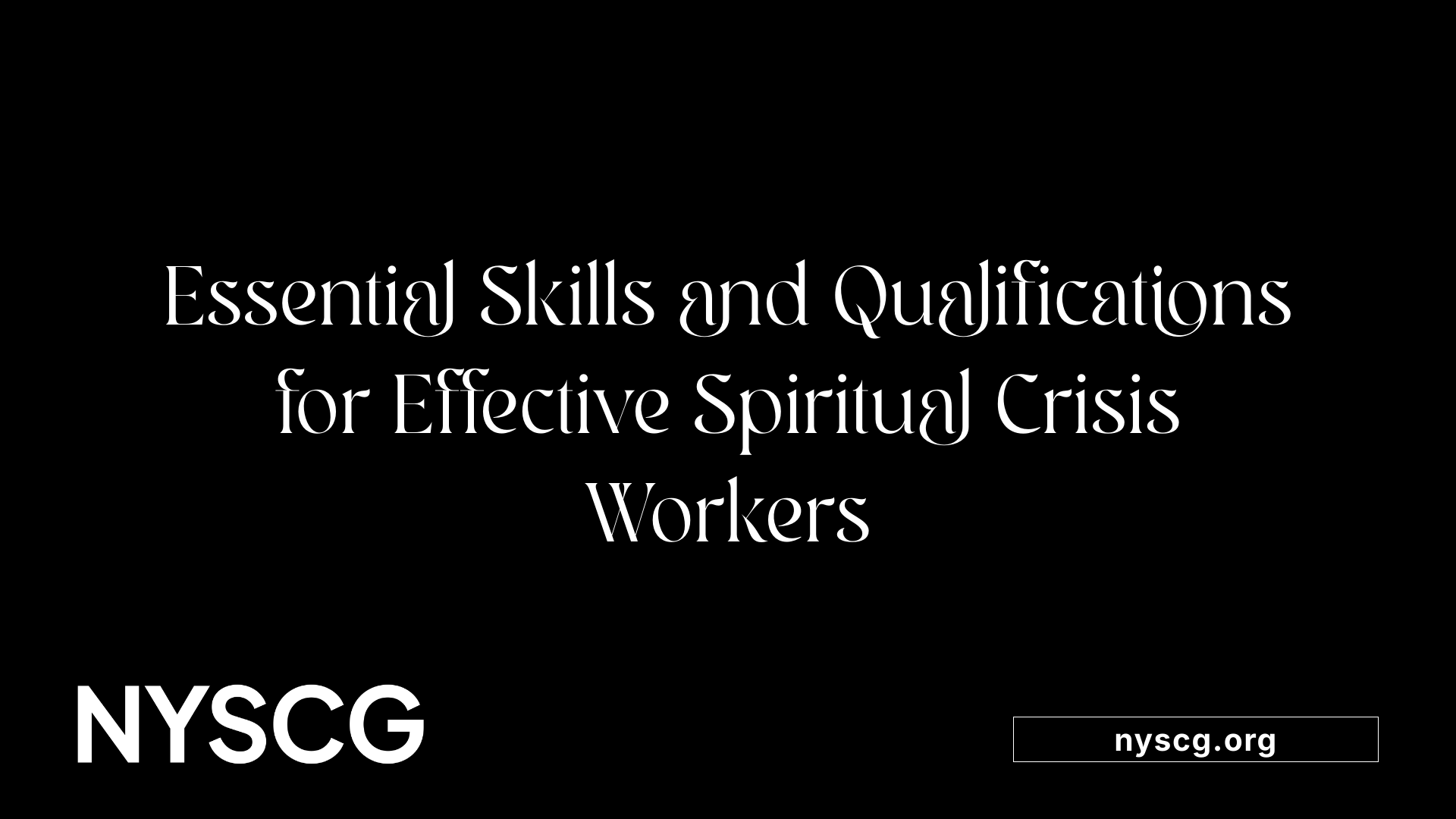Community-Based Crisis Intervention Careers for Spiritual Workers


Community-based crisis intervention careers for spiritual workers offer a unique and impactful avenue for combining faith, compassion, and professional mental health skills. These roles serve vital functions across diverse settings, requiring specialized education, training, and a deep commitment to holistic care. This article explores the various career options available, the educational and qualification pathways, job prospects, responsibilities, and avenues for professional growth within this meaningful sector.

Spiritual workers interested in crisis intervention have a range of rewarding career paths available to them. These roles include spiritual counselors, crisis intervention specialists, program coordinators, and mental health support personnel. They often serve within faith-based community organizations, churches, nonprofit agencies, and social service groups.
Graduates from faith-focused academic programs, such as those from Concordia University, Nebraska, are trained in human development, biblical principles, and interpersonal skills necessary for crisis support. These individuals use a blend of Scripture, spiritual guidance, and modern therapeutic techniques to foster healing and restoration.
Typical responsibilities involve providing emotional and spiritual counseling, conducting risk assessments during crises, developing and managing support programs, and linking individuals to community resources. Their work helps individuals navigate emotional struggles, trauma, or mental health challenges, all within a faith-based framework.
Spiritual crisis intervention professionals can work across diverse settings:
| Setting | Focus | Additional Details |
|---|---|---|
| Faith-based centers | Spiritual and emotional support | Often serve local communities or congregations |
| Churches | Pastoral crisis care | May involve training church staff in crisis response |
| Community organizations | Holistic crisis response | Combining community outreach with faith-based support |
| Nonprofit agencies | Crisis intervention programs | Often focus on vulnerable populations |
These careers enable spiritual workers to combine their faith with a commitment to supporting individuals and families during difficult times.
A significant aspect of these roles is the integration of religious faith with contemporary therapeutic practices. This approach respects individual beliefs while employing evidence-based strategies for crisis management.
Spiritual counselors and crisis responders incorporate Scripture and prayer into their interventions, creating a holistic support system. Training programs emphasize both theological understanding and practical skills, ensuring professionals can address crises sensitively and effectively.
They work closely with mental health professionals, such as social workers, counselors, and medical staff, to provide comprehensive care. This collaboration ensures that individuals receive both spiritual comfort and appropriate clinical treatment.
Most careers in faith-based crisis work require specialized education. Many institutions, like Concordia University, Nebraska, offer online programs tailored to preparing students for this field. These programs include field placements for hands-on experience and aim to qualify students for leadership roles.
Advancement in this sector often involves gaining experience, ongoing theological training, and certification in crisis intervention methods. Continuous education helps professionals stay current with best practices and integrate new therapeutic approaches with their spiritual care techniques.
| Degree | Focus | Typical Opportunities |
|---|---|---|
| Bachelor’s in Faith-Based Support | Basic counseling skills within a spiritual context | Entry-level support roles |
| Master’s in Pastoral Counseling or Theology | Advanced crisis intervention, leadership | Program coordinators, senior counselors |
| Certification in Crisis Response | Specialized training | Workshop leaders, crisis responders |
By combining faith-based education with practical experience, spiritual workers can become vital contributors to community resilience and individual recovery during crises.

Starting a career in community-based spiritual crisis intervention typically requires a combination of formal education and specialized training.
Firstly, individuals generally pursue foundational education in religious studies, theology, or related fields. This can often begin at the bachelor’s level, where students learn about different faith traditions, spiritual care, and ethical considerations. Such education provides a strong base for understanding diverse spiritual needs and developing cultural competence.
Building on this foundation, many pursue advanced academic qualifications. The Master of Divinity (MDiv) degree or an equivalent credential is highly recommended or required for those seeking more specialized roles. These programs deepen knowledge in pastoral care, ethics, and counseling techniques, preparing students for a variety of settings including hospitals, community centers, and rehabilitation programs.
Practical experience is a crucial part of training. Clinical Pastoral Education (CPE) programs are essential, offering supervised clinical practice in real-world environments such as hospitals, hospices, or correctional facilities. CPE enables spiritual workers to develop skills in crisis intervention, interfaith support, and emotional resilience. Many employers require candidates to have completed CPE before hiring.
Certification enhances professional credibility and often improves job prospects. Recognized organizations like the Association of Professional Chaplains or the National Association of Jewish Chaplains offer certification programs. Certification typically involves meeting educational prerequisites, completing supervised clinical hours, and passing competency assessments.
Additional courses focused on crisis intervention, trauma response, peer counseling, and mental health first aid are valuable. These can be obtained through various organizations, including the International Critical Incident Stress Foundation (ICISF), which provides specialized training tailored to crisis responders.
Combining these educational steps and trainings prepares spiritual responders to serve effectively in diverse community settings. They gain the skills needed to provide compassionate care, navigate complex emotional and spiritual issues, and address the needs of individuals experiencing crises.
In summary, a comprehensive pathway encompasses a solid academic background, hands-on clinical training, and professional certification. This multi-faceted approach ensures practitioners are well-equipped to support individuals and communities facing spiritual and emotional distress.
| Education Level | Typical Offerings | Additional Certifications | Suitable For |
|---|---|---|---|
| Bachelor's Degree | Religious studies, theology | N/A | Entry-level community support roles |
| Master’s Degree | MDiv, equivalents | Certification from professional bodies | Advanced spiritual care roles |
| Post-Graduate Training | CPE programs | Specialized crisis intervention courses | Healthcare, crisis response |
| Certification | Professional chaplaincy credentials | Trauma, peer counseling | Qualified spiritual crisis responders |
Engaging in these educational and practical steps not only fosters personal growth but also enhances the capacity to serve effectively within community-based crisis intervention frameworks.

Working in community-based crisis intervention as a spiritual worker requires a solid educational foundation, practical skills, and relevant experience.
Educational qualifications typically include advanced degrees such as a Master’s in pastoral counseling, theology, or psychology. These programs provide essential knowledge of mental health, spiritual care, and counseling techniques.
Certification or licensure in counseling or pastoral care is often necessary to ensure professional standards and accountability. Such credentials confirm that the worker has met specific educational and field experience requirements.
Core skills vital for effective service include empathy, active listening, and trauma-informed care. These qualities help build trust and provide emotional comfort to individuals in distress. Conflict resolution skills are also important, enabling workers to de-escalate tense situations and facilitate positive outcomes.
Experience plays a crucial role in preparing spiritual workers for crisis response, trauma care, and community outreach. Typically, two to five years of professional experience in related fields such as counseling, social work, or outreach enhances readiness for these roles.
In addition, a thorough knowledge of religious texts and spiritual assessments aids in understanding clients' spiritual needs and developing appropriate care plans. Maintaining client confidentiality is fundamental to ethical practice.
Many programs recommend additional specialized training, including courses in crisis intervention and critical incident stress management. Such training equips workers with the skills necessary to handle urgent cases effectively.
Overall, a blend of education, practical skills, cultural sensitivity, and ongoing training ensures spiritual workers can provide compassionate, competent support to those in crisis.
| Qualification/Skill | Description | Additional Notes |
|---|---|---|
| Advanced Degree | Master's in pastoral counseling, theology, or psychology | Provides foundational knowledge in mental health and spiritual care |
| Certifications/Licensure | Credentialing in counseling or pastoral care | Ensures professional standards and validation |
| Empathy and Active Listening | Key interpersonal skills | Build trust and facilitate emotional safety |
| Trauma-Informed Care | Understanding trauma effects | Essential for sensitive response |
| Conflict Resolution | Managing tense situations | Prevents escalation, fosters safety |
| Experience in Crisis Response | Field experience | 2-5 years often recommended |
| Knowledge of Religious Texts | Understanding spiritual aspects | Supports personalized care |
| Confidentiality | Ethical handling of information | Critical for trust and privacy |
For more details on the qualifications necessary for roles in spiritual crisis intervention, search for 'Qualifications for spiritual crisis intervention roles'.

The field of spiritual crisis intervention offers a range of promising job prospects across various organizations dedicated to community well-being and emergency response.
Hospitals, community centers, faith organizations, and social service agencies are actively seeking qualified spiritual workers such as chaplains, spiritual care providers, and crisis support specialists. These roles focus on offering emotional support, spiritual guidance, and crisis intervention during times of trauma, illness, or disaster.
Organizations like Samaritan’s Purse, known for disaster relief efforts, and Trinity Health, a major healthcare provider, are among those recruiting spiritual workers to serve in diverse settings. These roles may include providing grief counseling, facilitating spiritual assessments, and supporting individuals and families navigating crises.
Employment pathways in this field are varied and flexible. Opportunities range from seasonal roles responding to specific emergencies, internships for newcomers seeking experience, to veteran positions for those with established backgrounds in spiritual care.
The increasing focus on mental health and holistic care models contributes to a steady demand for spiritual crisis workers. As communities prioritize comprehensive approaches to wellness, the need for skilled spiritual support within crisis intervention frameworks continues to grow.
Overall, the landscape remains dynamic, with multiple avenues available for those interested in pursuing careers that combine spiritual guidance and crisis management.
| Opportunity Type | Typical Roles | Description | Example Organizations |
|---|---|---|---|
| Seasonal Roles | Crisis support, disaster response | Short-term positions helping during specific events | Samaritan’s Purse, FEMA |
| Internships | Entry-level spiritual care training | Gain experience while supporting ongoing community programs | Local faith organizations, hospitals |
| Veteran Positions | Full-time chaplaincy, spiritual counseling | Long-term careers with professional development | Trinity Health, VA hospitals |
| Volunteer Opportunities | Peer support, community outreach | Volunteer-based roles for community engagement | Local faith groups, nonprofit organizations |
This diverse range of opportunities ensures that spiritual workers can find roles suited to their experience level and career goals, contributing significantly to community resilience and individual healing during crises.

Spiritual workers are vital members of community-based crisis response teams. They primarily provide emotional support and spiritual guidance to individuals facing traumatic events, loss, or existential questions. Their work involves creating a safe, empathetic space where people can express their feelings, find meaning in their experiences, and address spiritual or cultural concerns.
These responders work closely with mental health professionals, first responders, and social workers to ensure that the individual’s psychological and spiritual needs are met holistically. They may assist with performing rituals, such as last rites or memorial ceremonies, offer grief counseling, and help clients develop coping mechanisms to manage moral injury or spiritual distress. By doing so, they foster resilience, community cohesion, and hope during challenging times.
Their role is not only about spiritual guidance but also includes facilitating communication among various support systems and advocating for the individual's overall well-being across different dimensions—emotional, spiritual, and social. This integrated approach helps ensure a comprehensive response to crises, promoting healing and recovery within the community.
The integration of spiritual work into community-based crisis intervention not only enhances immediate response efforts but also promotes long-term recovery and resilience. As the mental health field increasingly recognizes the importance of holistic and culturally sensitive care, spiritual workers equipped with appropriate education, training, and certifications are positioned to make profound impacts. With expanding opportunities and a clear pathway for professional growth, these roles offer fulfilling careers that combine faith with service, helping individuals and communities restore hope and strength in the face of adversity.
All you need is the will to make the world a better place.
New York State chaplain group inc. is a tax deductible organization with a federal tax Id number 92-383-4921